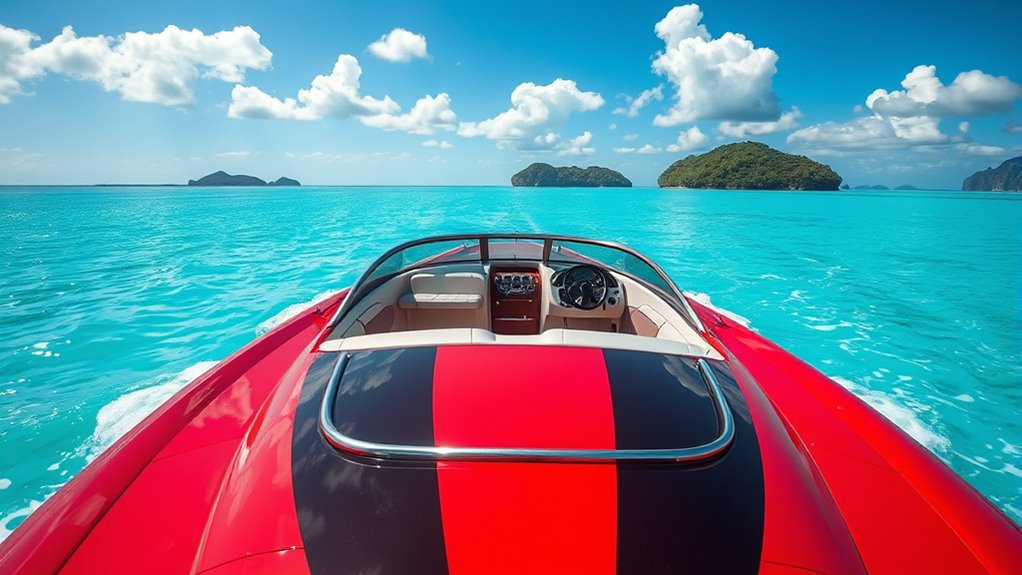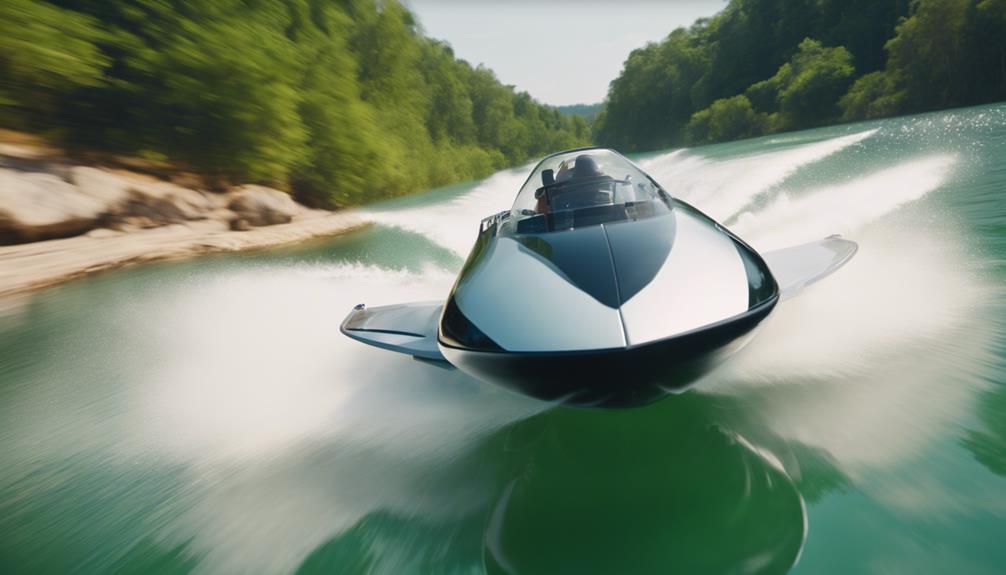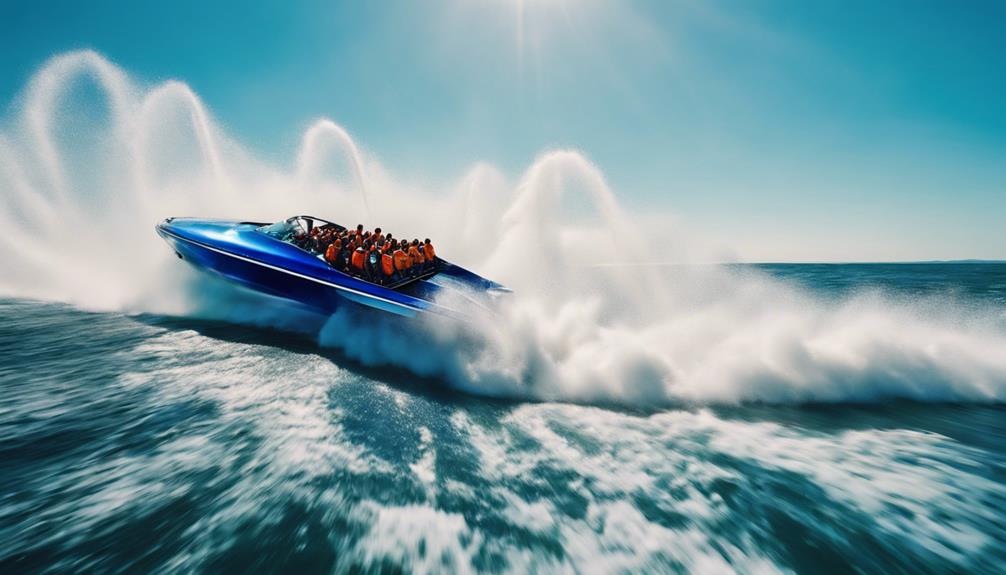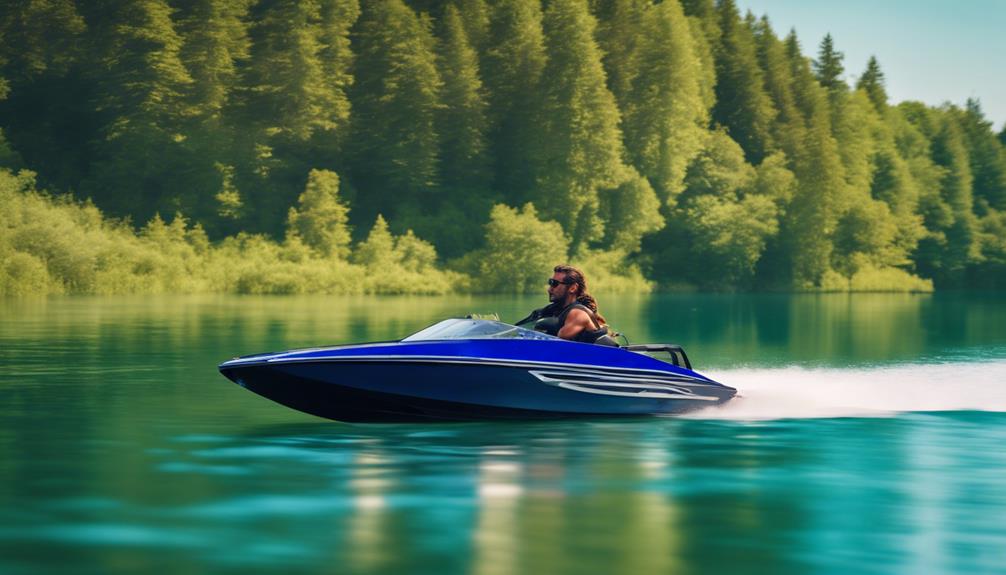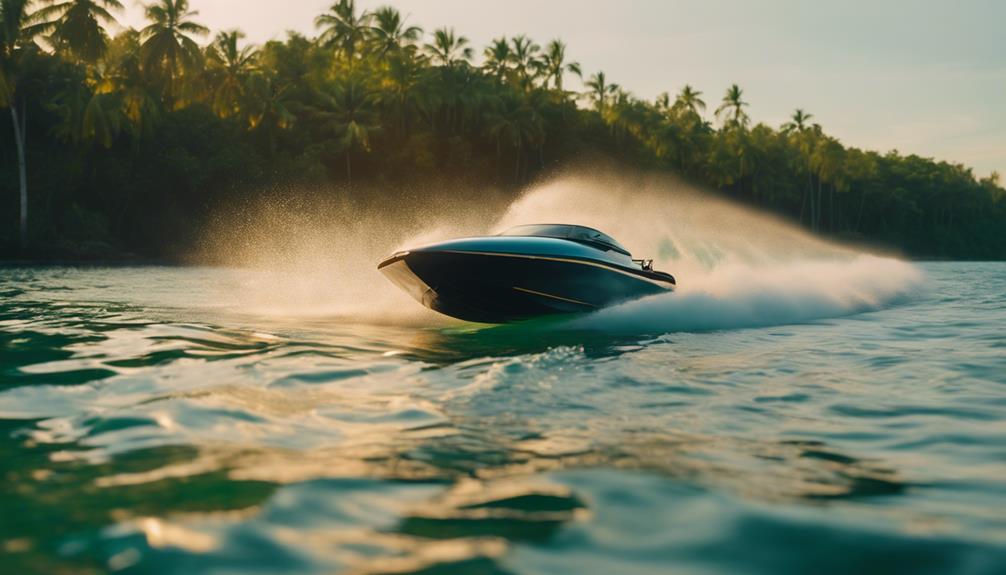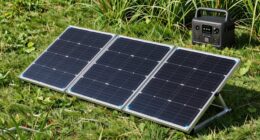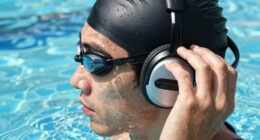To choose the right jet boat, consider your preferred water activities like skiing, fishing, or cruising, and pick a boat suited for those needs, whether a sport, family, or utility model. Think about performance features such as engine power, fuel efficiency, and handling, along with size and seat capacity that match your typical group. Safety certifications and built-in safety features are essential for peace of mind. Budget and maintenance costs also matter. Exploring these factors will help you find the perfect match for your lifestyle.
Key Takeaways
- Determine your primary water activity (fishing, waterskiing, family cruising) to select suitable boat features and size.
- Consider passenger capacity, storage needs, and boat size for comfort and handling.
- Evaluate engine power, speed, and fuel efficiency to match activity demands and budget.
- Check safety certifications and built-in safety features for reliable and secure boating.
- Test drive the boat in similar conditions to assess handling, comfort, and overall performance.

AS ColdPlunge Ice Bath Chiller & Cold Plunge Tub Kit, 1/3HP Cold Plunge Chiller with External Pump & Filter, XXL 148Gal Upgraded Ice Pod, Cold Plunge Tub with Water Chiller for Cold Therapy Recovery
Complete Cold Plunge Recovery Kit — Ice-Free and Hassle-Free: This all-in-one cold plunge bundle includes a 1/3 HP...
As an affiliate, we earn on qualifying purchases.
Understanding Different Types of Jet Boats
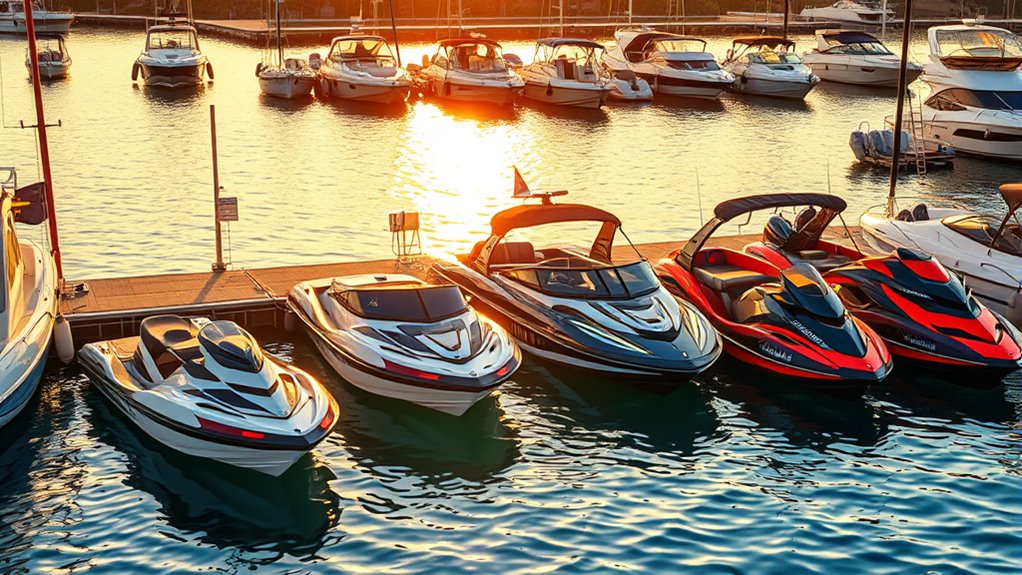
Understanding the different types of jet boats is essential for choosing the right vessel for your needs. You’ll find options like sport boats, which excel in high-speed performance and agility, perfect for adrenaline junkies. If you’re into fishing, a jet boat with ample storage and stability might suit you best. For family outings, consider a spacious, comfortable model with seating for everyone. Utility jet boats are designed for work or rugged activities, offering durability and strength. Some boats feature open decks, ideal for water sports or casual cruising, while others are more enclosed for protection and comfort. Recognizing these distinctions helps you narrow down choices based on your primary activities, ensuring you select a jet boat that matches your lifestyle and expectations. Additionally, understanding return policies can be useful if you decide to purchase your boat online or return accessories. Being aware of performance features like engine power and handling characteristics can further assist in making an informed decision. Moreover, staying informed about market trends such as new innovations and regulations can help you choose a model that remains relevant and compliant in the evolving boating industry. Furthermore, knowledge of advanced propulsion systems can provide insights into efficiency and eco-friendliness, which are increasingly important in modern boat design.

M METERXITY XXL Ice Bath Tub, Inflatable Cold Tub with Lid, Portable Oval Ice Plunge Tub, Water Chiller Compatibility, Thermometer, Dual-Action Pump for Athletes/Recovery/Outdoor/Indoor
[What Will You Receive?]-Ice Bath Tub*1, Top Lid*1, Dual-action Hand Pump*1, Thermometer*1, Silicone Ice Molds*2, Carry Bag*1, Repair...
As an affiliate, we earn on qualifying purchases.
Assessing Your Water Activities and Usage Needs
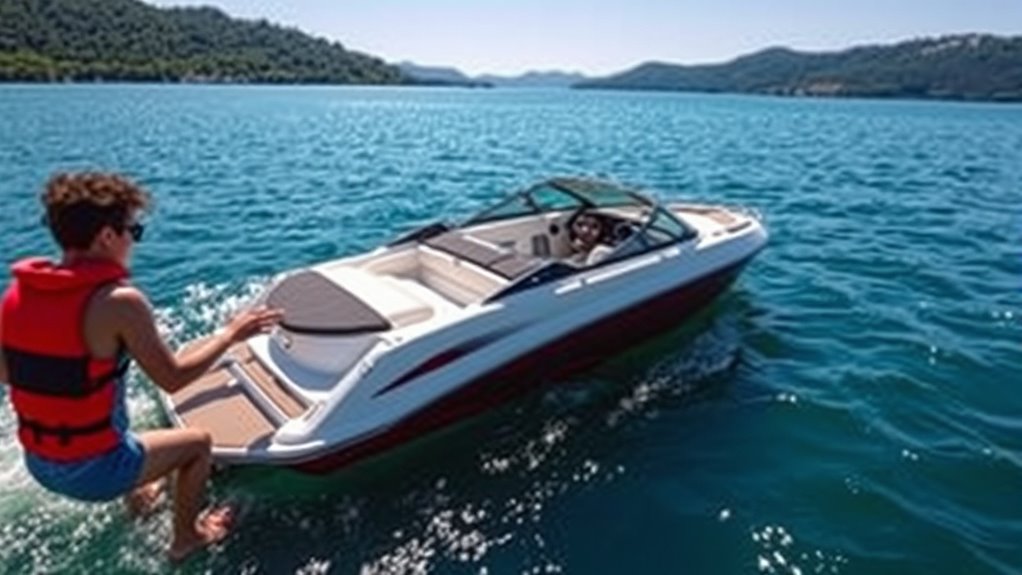
To choose the right jet boat, you need to clearly identify how you plan to use it on the water. Think about your primary activities—do you want to waterski, wakeboard, fish, or explore calm lakes? If you’re into high-speed thrills, a powerful, agile boat suits you best. For relaxing cruises or fishing trips, look for models with stability and ample storage. Consider how many people you’ll typically carry; larger groups require bigger boats with comfortable seating. Also, reflect on the typical water conditions you’ll encounter—choppy waters demand a different setup than smooth, inland lakes. By understanding your specific activities and how often you’ll use the boat, you can focus on features that enhance your experience and ensure you select a model that fits your lifestyle perfectly. Additionally, exploring water park options can provide inspiration for fun water activities to enjoy with your new jet boat. Knowing about watercraft features can help you prioritize the specifications that will make your experience safer and more enjoyable. A thorough understanding of personality traits can also assist in selecting a boat that aligns with your adventurous or relaxed water pursuits. Considering the special occasion when you’ll be using the boat can also influence your choice, ensuring it is suitable for celebrations or family outings.

Cold Plunge Tub for Ice Baths at Home - 110 Gal Outdoor & Indoor Cold Water Plunge Tub with Lid - Water Chiller Compatible - XL Recovery Cold Plunge for Athletes - Portable Ice Bath & Accessories
BIG ATHLETES, BIGGER RECOVERY. – At 110 gallons and 30” high, this XL cold plunge tub fits 6ft+...
As an affiliate, we earn on qualifying purchases.
Evaluating Key Performance Features
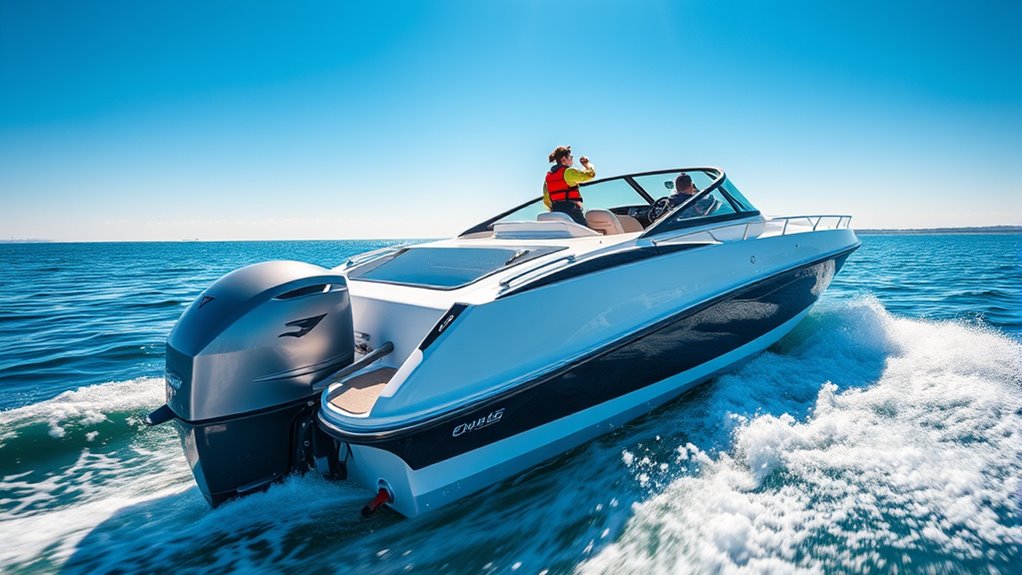
Evaluating key performance features is essential to guarantee your jet boat performs reliably and meets your expectations on the water. Focus on aspects like speed, acceleration, fuel efficiency, maneuverability, and stability. These factors influence how well your boat handles different conditions and activities. Understanding engine responsiveness can help you select a boat that delivers quick and smooth performance. A thorough evaluation of performance features will ensure you choose a vessel suited to your specific needs. | Performance Feature | Importance | What to Check |
| ———————— | ————– | ————– |
|---|---|---|
| Speed & Acceleration | Determines thrill and utility | Test for desired speeds and quickness |
| Fuel Efficiency | Saves money in the long run | Review engine and fuel consumption ratings |
| Maneuverability | Affects handling and control | Assess responsiveness and turning ease |
| Stability | Ensures safety and comfort | Observe boat’s balance in rough waters |
| Engine Power | Supports activities like towing | Match engine specs with your needs |

AKSPORT Ice Bath Tub for Athletes, 151 Gallons Inflatable Cold Plunge Tub Compatible with Water Chillers, Icebath for Recovery & Cold Water Therapy, Portable Bathtub for Indoor & Outdoor-Wood
✅ 【Compatible with Chiller】AKSPORT Ice bath equipment enhances your recovery experience. The cold water bathtub has water inlet...
As an affiliate, we earn on qualifying purchases.
Considering Size and Seating Capacity
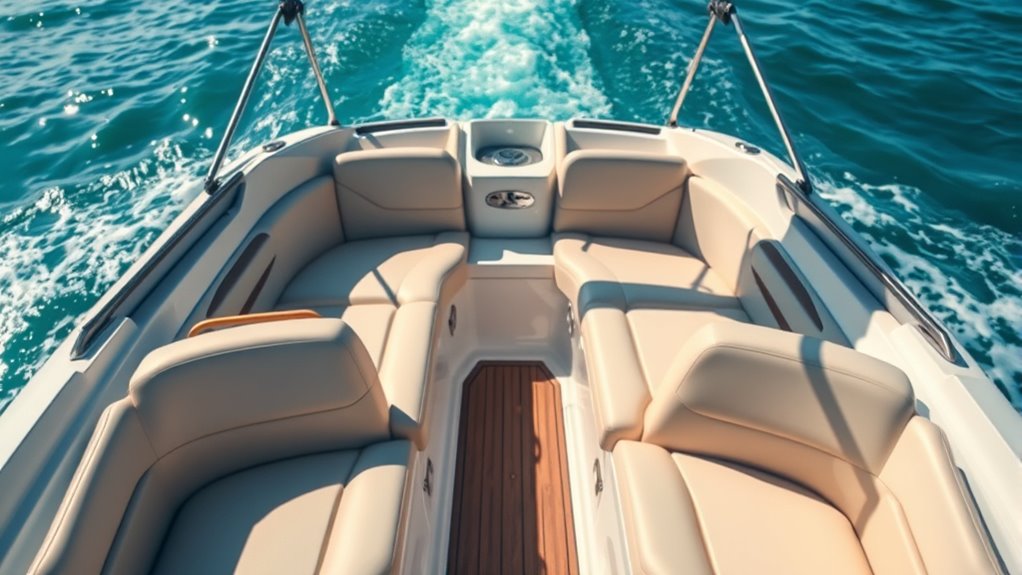
Choosing the right size and seating capacity guarantees your jet boat fits your needs and provides enough space for everyone on board. Consider how many people you’ll regularly have with you—families, friends, or solo trips. A smaller boat, around 12 to 14 feet, is perfect for solo outings or small groups, offering agility and ease of transport. If you often entertain larger groups or carry gear, look at models with more seating, typically 16 to 20 feet, which provide ample space and comfort. Think about storage needs too—larger boats usually have more storage compartments. Remember, a boat that’s too small can feel cramped, while one that’s too large might be harder to maneuver and maintain. Choosing a home arcade machine can also be a fun way to enjoy gaming at your convenience. Select a size that balances space, ease of handling, and your typical usage. Additionally, consider the performance capabilities of the boat to ensure it meets your power and speed requirements. When evaluating engines and overall horsepower, keep in mind how this will impact your boat’s speed and handling.
Setting Your Budget and Cost Expectations
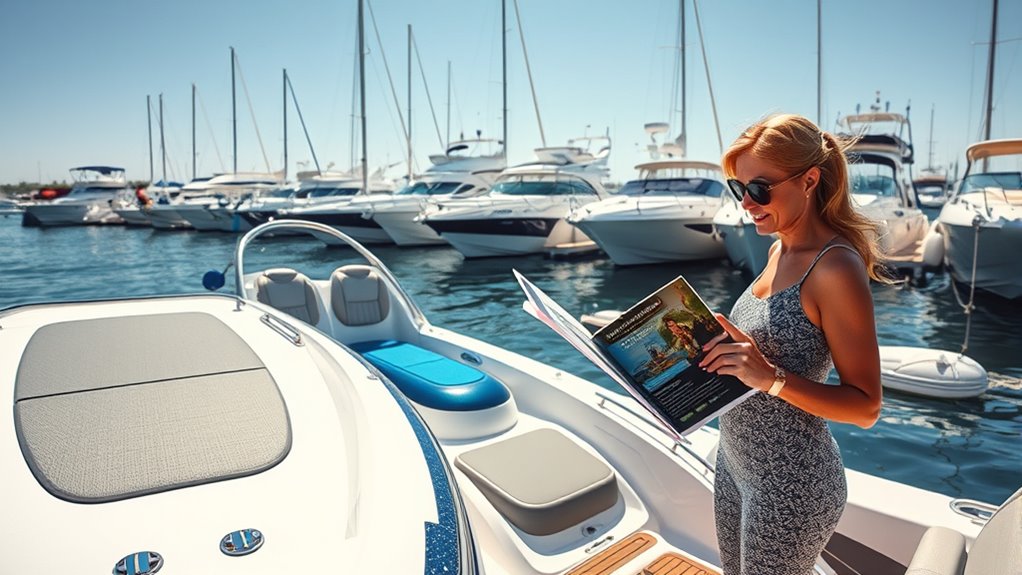
Setting a clear budget for your jet boat helps you focus your options and avoid overspending. Determine how much you’re willing to invest upfront, considering both purchase price and ongoing costs like maintenance, storage, and insurance. Be realistic about what features and size fit within your financial limits. Remember, higher-end models with advanced features cost more, but they may also save you money long-term through better fuel efficiency and durability. It’s wise to set aside extra funds for unexpected repairs or accessories. By establishing a solid budget, you’ll prevent impulse buys and ensure your choice aligns with your financial situation. Keep your expectations in check, and prioritize quality and essential features to maximize your enjoyment without stretching beyond your means. Additionally, understanding the cost expectations for different models can help you make informed decisions. Being aware of hosting and VPS discounts can also aid in managing your overall expenses if you’re planning to promote or manage related content online.
Analyzing Engine Power and Fuel Efficiency
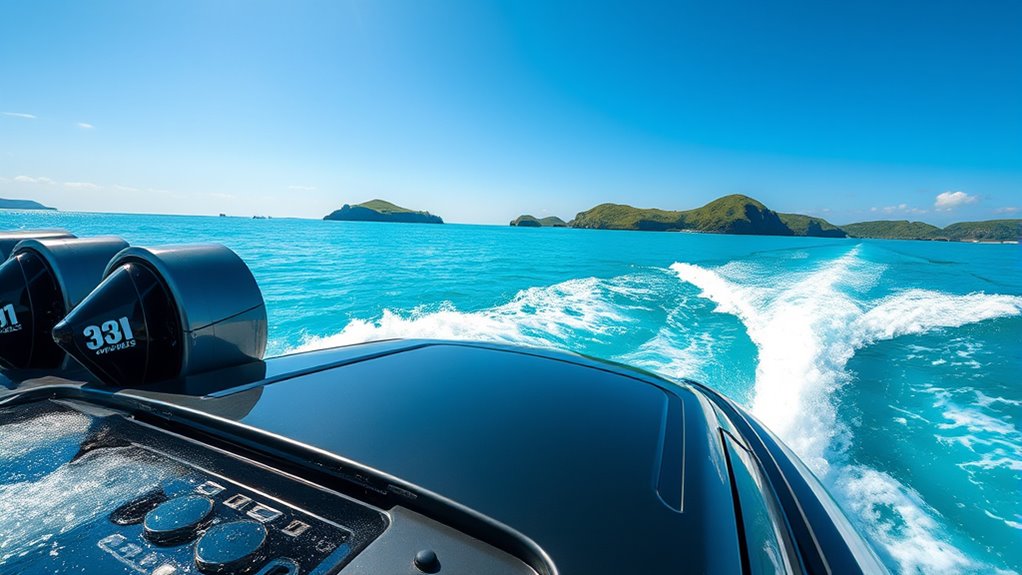
Understanding the balance between engine power and fuel efficiency helps you choose a boat that performs well without costing too much to run. You’ll want to compare how different engines use fuel at various power levels to find the best fit. Selecting the most suitable engine means considering both your performance needs and long-term fuel savings. Additionally, considering fuel consumption rates can be useful if you’re transporting perishable goods and want to minimize energy consumption during travel. Recognizing the types of dog names that suit your dog’s personality can also inspire your boat’s name to reflect its character. To optimize your choice, evaluating home decor trends related to efficiency and style can also provide insights into modern, practical boat features. Understanding air purifier features and technology can help you select a boat with integrated air quality solutions for comfort during extended trips.
Power vs. Fuel Use
When evaluating jet boats, it’s essential to contemplate how engine power impacts fuel consumption. A more powerful engine delivers faster speeds and better performance but uses more fuel. Conversely, a less powerful engine conserves fuel but might struggle with heavy loads or rough water. To find the right balance, consider these factors:
- Higher horsepower engines increase speed but drain fuel quickly
- Smaller engines are more fuel-efficient for casual cruising
- Overpowered boats can be costly to operate long-term
- Matching engine size to your typical boating style saves money and boosts efficiency
- Mazda Tuning insights reveal that engine modifications can optimize power and fuel efficiency, helping you strike the perfect balance.
Understanding this balance helps you choose a boat that fits your lifestyle without sacrificing performance or breaking the bank on fuel. Ultimately, your ideal boat will deliver enough power while keeping fuel use manageable.
Optimal Engine Choices
Choosing the right engine for your jet boat involves balancing power and fuel efficiency to match your boating needs. If you plan to tow wakeboarders or carry heavy loads, opt for a high-horsepower engine that delivers strong acceleration and top speed. However, these engines tend to consume more fuel, so consider your typical usage. For leisurely cruising or extended trips, a smaller, more efficient engine can save you money and reduce fuel stops. Look for engines with modern fuel-injection systems and variable pitch impellers, which optimize performance and efficiency. Keep in mind that maintaining your engine properly guarantees it operates at peak efficiency, giving you the best mix of power and economy for your adventures.
Examining Safety Features and Certifications

When selecting a jet boat, you need to check for mandatory safety certifications to guarantee it meets industry standards. Look for built-in safety features like grab handles and non-slip surfaces that protect you on the water. Additionally, verify that emergency equipment, such as life jackets and fire extinguishers, complies with safety standards for your peace of mind.
Mandatory Safety Certifications
Mandatory safety certifications guarantee that your jet boat meets essential standards for safety and reliability. These certifications ensure the boat has passed rigorous testing and adheres to industry regulations, giving you peace of mind on the water. When evaluating options, look for certifications like CE, NMMA, or USCG approval, which indicate compliance with safety standards. These certifications cover key aspects such as stability, fire resistance, and electrical system safety. Confirm that the boat has the appropriate documentation before purchasing. It’s also helpful to check for manufacturer warranties and safety records. Remember, certified boats are more likely to prevent accidents and protect you in emergencies. Prioritizing certified models helps you enjoy your time on the water confidently and responsibly.
Built-in Safety Features
Built-in safety features are essential components that enhance your jet boat’s protection and help prevent accidents. These features include automatic shut-offs, reinforced hulls, and secure throttle controls. Look for boats with fail-safe systems that cut power if you lose control, reducing risks. Reinforced hulls provide extra durability in collisions, while secure throttle controls prevent accidental acceleration. Consider the following safety features:
| Safety Feature | Function | Benefit |
|---|---|---|
| Automatic shut-off | Stops engine if operator falls overboard | Prevents runaway boat |
| Non-slip flooring | Reduces slips in wet conditions | Enhances footing |
| Reinforced hulls | Increases durability in impacts | Better protection |
Prioritize these built-in features to keep your time on the water safe and enjoyable.
Emergency Equipment Standards
Making sure your jet boat meets emergency equipment standards is crucial for safety on the water. These standards guarantee you’re prepared for unexpected situations. Look for boats that have certifications like the US Coast Guard or CE marking, which verify compliance with safety regulations. Key safety features include:
- Life jackets for all passengers
- Flares and signaling devices
- Fire extinguishers
- Emergency radio or communication devices
Having these items on board isn’t just a recommendation; it’s a requirement in many areas. Properly certified equipment ensures reliability and compliance, giving you peace of mind. Always check that your boat’s safety gear is up to date and easily accessible before heading out. Staying compliant not only protects you but also makes rescue efforts faster if needed. Safety standards are your first line of defense against emergencies on the water.
Comparing Maintenance and Durability Factors
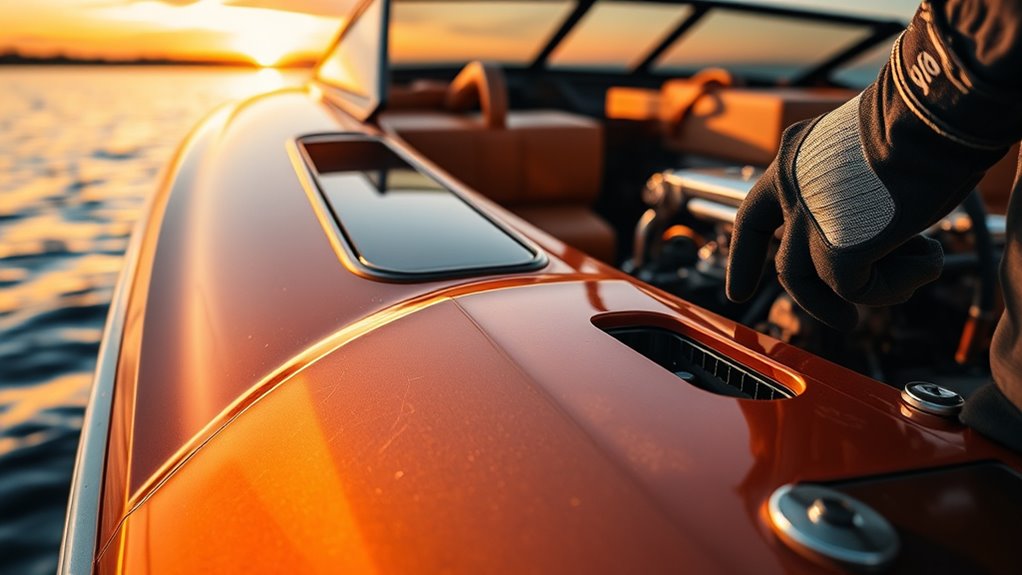
When comparing maintenance and durability, it’s important to take into account how different jet boat models hold up over time and how much effort they require to keep running smoothly. Some boats use more durable materials like stainless steel or reinforced hulls, which last longer but may cost more upfront. Others might need frequent engine checks or hull cleaning, affecting long-term care. To help evaluate, here’s a quick comparison:
| Aspect | High Durability Model | Moderate Durability Model | Lower Durability Model |
|---|---|---|---|
| Material Quality | Reinforced, corrosion-resistant | Standard composites | Basic materials |
| Maintenance Frequency | Less frequent, longer lifespan | Moderate upkeep | Higher, more repairs needed |
| Cost of Repairs | Lower over time | Moderate | Higher over time |
| Ease of Maintenance | Simplified, fewer parts | Moderate complexity | More involved |
| Longevity | 10+ years | 5-10 years | Under 5 years |
Choose based on how much effort you want to invest and how long you want it to last.
Exploring Additional Features and Customizations
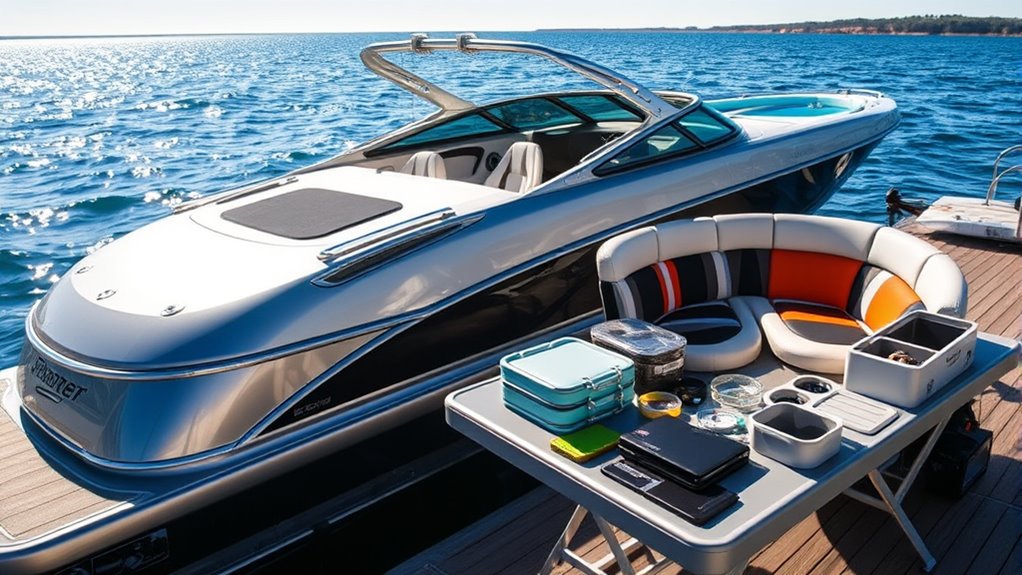
Adding extra features and customizations can considerably enhance your jet boat’s performance and comfort, allowing you to tailor it to your specific needs and preferences. You might consider upgrading your seating for added comfort or installing a high-quality stereo system for better entertainment. Custom storage solutions help keep your gear organized, while advanced navigation or GPS systems improve safety and ease of use. Other popular options include hydraulic steering for smoother handling, specialized lighting for night outings, or additional safety features like backup cameras. By customizing your jet boat with these features, you create a vessel that truly fits your lifestyle, whether you’re seeking adventure, relaxation, or both. Focus on what enhances your experience and makes your time on the water more enjoyable.
Tips for Testing and Selecting the Perfect Jet Boat

Finding the perfect jet boat requires careful testing and evaluation to guarantee it meets your specific needs. Start by taking it for a thorough test drive in conditions similar to where you’ll be using it most. Pay attention to how smoothly it accelerates, handles turns, and maintains stability at various speeds. Check the responsiveness of the steering and the ease of controlling the boat. Listen for unusual noises and observe the boat’s performance in different water conditions. Inspect the seating, storage, and accessibility features during the test. Ask questions about maintenance, warranty, and after-sales support from the dealer. Remember, a hands-on experience helps you identify comfort, control, and reliability—key factors in selecting the right jet boat for you.
Frequently Asked Questions
What Are the Best Jet Boat Brands for Beginners?
When selecting a jet boat for beginners, you want brands that prioritize safety, reliability, and ease of use. Look for models from Sea-Doo, Yamaha, and Kawasaki, as they offer user-friendly features and good customer support. These brands provide affordable options with intuitive controls, making your learning curve smoother. By choosing reputable brands, you guarantee a safer, more enjoyable experience on the water while building confidence behind the wheel.
How Does Water Temperature Affect Jet Boat Performance?
While water temperature might seem subtle, it quietly influences your jet boat’s performance. Warmer water reduces its density, allowing your boat to glide more effortlessly and accelerate faster. Conversely, colder water is denser, offering more resistance and potentially slowing you down. You’ll notice smoother rides in warm conditions, but colder temps demand a bit more effort. Being mindful of water temperature helps you optimize your boat’s handling and enjoyment on the water.
Are There Eco-Friendly Jet Boat Options Available?
Eco-friendly jet boat options do exist, and you can find models designed to minimize environmental impact. Many use cleaner fuels or hybrid systems that reduce emissions and fuel consumption. You might also consider electric jet boats, which produce zero emissions and operate quietly. When exploring these options, look for boats with eco-certifications and environmentally conscious features to enjoy your adventures while protecting the planet.
What Are Common Jet Boat Maintenance Mistakes to Avoid?
Your jet boat relies on your care to keep it running smoothly, and avoiding common maintenance mistakes can save you from disaster. Don’t neglect regular oil changes or skip inspecting the impeller—these are like ignoring a ticking time bomb. Avoid using the wrong fuel or ignoring corrosion. Keep your boat clean and follow the manufacturer’s maintenance schedule. Staying vigilant guarantees your boat stays powerful, safe, and ready for adventure whenever you are.
How Can I Insure My Jet Boat Effectively?
To guarantee your jet boat effectively, you should start by researching different coverage options and comparing quotes from reputable providers. Make certain you understand what’s included, like liability, theft, and damage coverage. Keep your boat well-maintained and document all repairs, as this can lower premiums. Ultimately, consider bundling your insurance with other policies for discounts, and always read the policy details carefully to ensure you’re fully protected.
Conclusion
Choosing the right jet boat isn’t just about features or price—it’s about finding a vessel that matches your lifestyle and passions. While a sleek, high-performance boat offers thrills, a sturdy, reliable one provides peace of mind. Sometimes, simplicity brings the greatest joy; other times, extra features enhance your adventure. Ultimately, your perfect jet boat balances your needs with your dreams, proving that the right choice isn’t just about specs—it’s about creating memories that last a lifetime.

